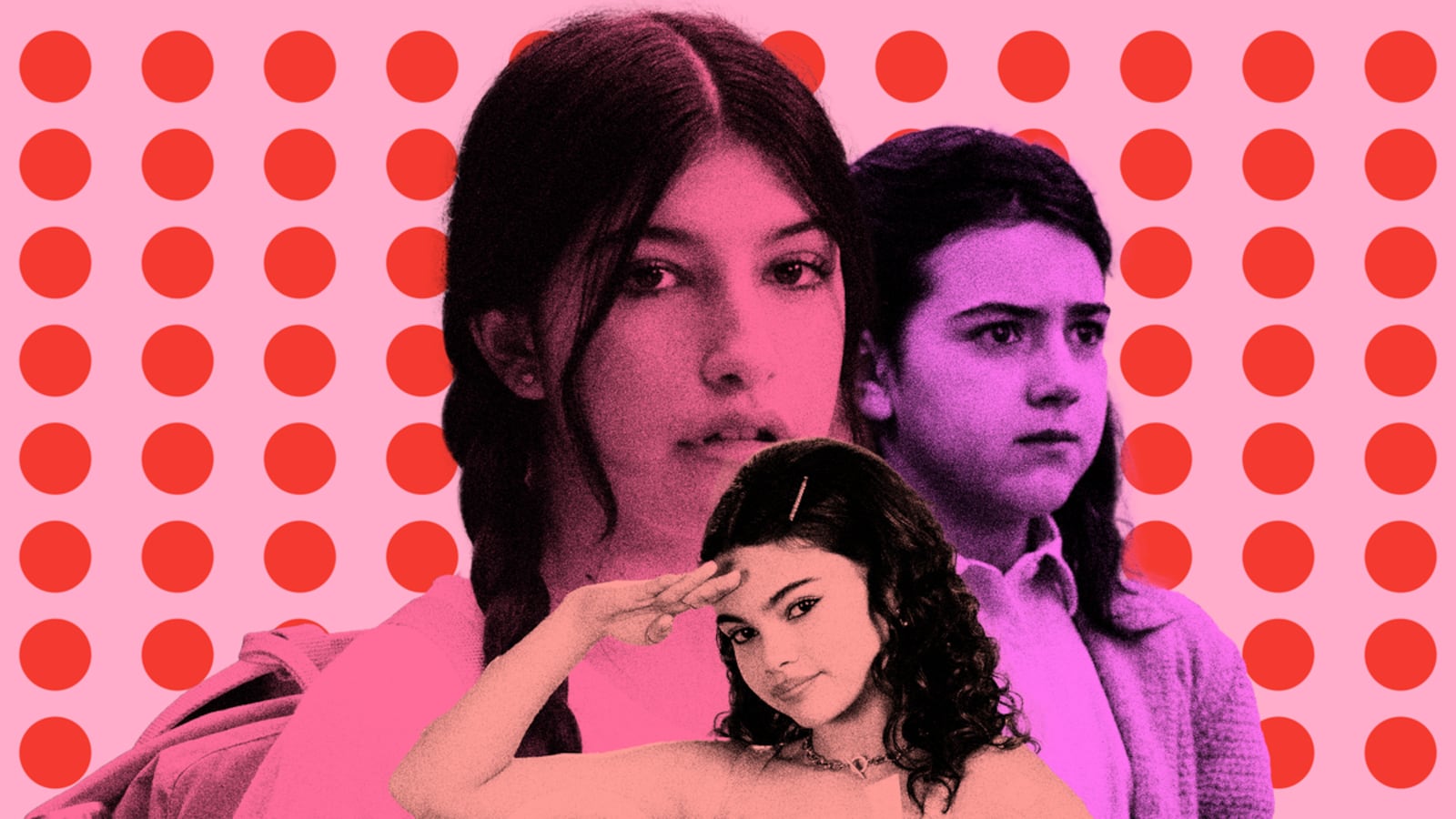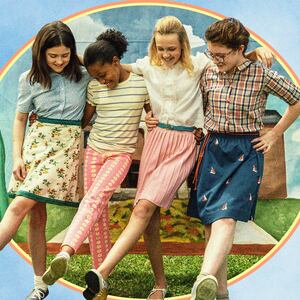The most mortifying day of my life happened when I was in middle school, as I’m sure it was for everyone.
I’ll spare you the extended details of that perilous day, but the long and short of it is that a popular girl sitting in front of me in class made a remark about how ugly glasses and braces look together. Behind her, I silently wished I could rip those pesky neon pink braces off my teeth and shove my oversized Ray-Bans into my pocket. Alas, when she turned around to ask me a question, she gasped loud enough for the entire class to hear.
“Oh my God,” she said. “I’m so so sorry for what I said about braces and glasses being ugly. I’m sure you heard me. But you’re pulling it off!”
Photo evidence will prove that I was not, in fact, “pulling it off.” With untamed orange hair, off-kilter front teeth, and boxy glasses, I looked like a slightly more feminine version of Chuckie from Rugrats. After that, in eighth grade, I vowed to never open my mouth in public again. (I talk a lot. That didn’t last very long.)
Nothing could make me feel OK about myself. I was fighting the battle that every adolescent girl is thrust into when she enters middle school. Everything was an embarrassment—my friends, my parents, me. I bought clothes that would make me feel cooler, but in fact, yoga pants were too short on my tree limb legs, my Target skinny jeans looked weird with Sperry Topsiders, and I didn’t have the boobs to make any shirts look good. When was I going to get boobs? (Now, I want to rescind some of my most forceful wishes for boobs at age 13. My wishing worked too much—the back pain isn’t worth it.)
My biggest desire, though, wasn’t to get my period or get bigger boobs or make the cute guy in my class fall in love with me. More than anything, I wanted to feel less alone in the turbulent hurricane of middle school. No one told me how hard it would be—just that everything might hurt all the time because of a growth spurt called “puberty.” My parents offered me books like The Care & Keeping of You and Are You There, God? It’s Me, Margaret, which helped. But I was—and always will be—obsessed with movies, and looking to them for guidance was disappointing. The catalog of middle school movies at the time was slim, and the few that existed weren’t accurate to my experience at all. 13 Going on 30 was cute, but it was not relatable in any sense.
Alas, in 2023, things have changed. It warms my heart to see a real renaissance of middle school movies for girls. A couple of my favorite YA books—namely Margaret and You Are So Not Invited to My Bat Mitzvah—have gotten splashy adaptations. Then, of course, there’s the whole Barbie phenomenon, which shines a light on the struggles of girlhood. Nowadays, middle school girls don’t have to feel alone in the world. I just wish I had these movies when I was 13!
Along with having incredibly long titles, Are You There, God? It’s Me Margaret and Netflix’s You Are So Not Invited to My Bat Mitzvah both take place around the same treacherous part of middle school—even if they don’t take place in the same era. Although Margaret is set in the ’70s, the Judy Blume story is timeless. A young girl tries to figure out her relationship with God and puberty after moving from New York City to suburban New Jersey. And more than anything, all that soon-to-be 12-year-old Margaret Simon (Abby Ryder Fortson) wants is her period.
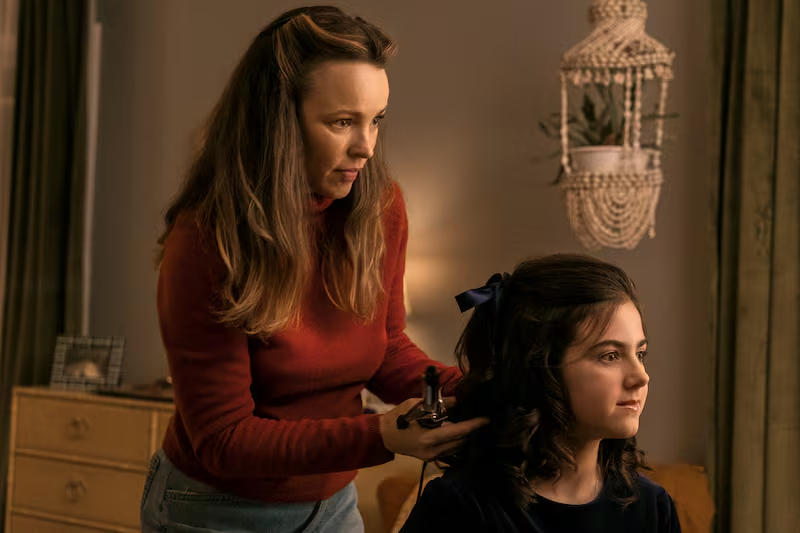
Ironically, despite being a year older than Margaret, Stacy Friedman (Sunny Sandler) of Bat Mitzvah is the opposite when it comes to anticipating puberty. After diving into a lake to impress her crush, her bright red pad floats to the top of the water for the entire eighth grade class to see. Immediately, Stacy loses it—can’t we get rid of periods, once and for all? Or, at least, can’t we normalize them instead of laughing at them? All Stacy wants is to have a big New York-themed Bat Mitzvah with her best friend, Lydia (Samantha Lorraine), although Lydia can’t stop sneaking off with the popular girls.
The classic give-and-take with puberty—if you’re going through it you want it to be over, but if you’re a late bloomer you wish it would show up ASAP—is mastered by both movies in a way that’s digestible for younger audiences, while also maintaining an absurd, familiar hilarity for older viewers. These movies aim to relieve the pressure on middle school girls by enlightening them, while also calling for some empathy for the older folks who may watch.
Although periods and newfound awkwardness stink, no threat is greater than the biggest predator of middle school life: 13-year-old boys.
Both Margaret and Stacy have crushes on the standard-issue most popular boy in class. Oh, he’s glorious. He’s just such a hunk. He’s around 4-feet-8-inches tall, hasn’t brushed his Bieber cut in three days, smells like gym class, and when he says “Sup?” it’s like the world is ending. In middle school, chatting with these boys feels like a life-or-death moment. But from an older perspective, scenes with these little lads feel ripped straight out of an SNL sketch—why are these sweet, adorable girls going feral for runts who can’t spell?
Margaret actually gets to smooch her crush, Philip Leroy (Zackary Brooks), at a pal’s birthday party where the kids play Seven Minutes in Heaven. Her grin can barely fit on her tiny little face when they break apart. Her friends are pissed—they all like him too! They needn’t worry about it too much. A few weeks later, Philip brings Margaret a gift for her birthday: It’s a squeeze on her arm. Huh?
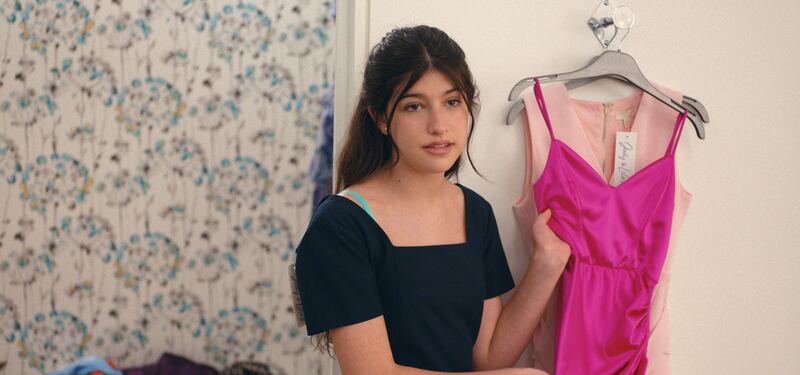
“A pinch to grow an inch,” Philip teases, pointing towards Margaret’s chest. Ugh. Margaret has been working on chest-thrusting stretches while chanting “I must, I must, I must increase my bust,” but no such luck. Margaret’s joyful birthday smile fades away. All of our hearts collectively break.
This emotional change—from chipper and outgoing to embarrassed and quieter—is huge in a movie like Barbie. While middle school girls don’t play a huge role in Barbie, Greta Gerwig’s major blockbuster hit has plenty of themes related to coming-of-age and being an adolescent girl. The whole point of Barbie, as Gerwig has stated in interviews, is to show how society forces young girls to lose their unapologetically bright energy when they transition from adolescence into adulthood. Barbie (Margot Robbie) follows this same arc. She’s proud to be a woman, excited about life, playful and fun. Then, she enters the real world, where women are put down by men in society; based on this experience, Barbie decides she doesn’t want to be a real adult.
Even though she’s a doll meant to look like an adult woman, Barbie’s story is akin to both Stacy’s and Margaret’s: She wants to stay unbothered, happy, and unaffected by the real world of gynecologists and the patriarchy forever. But each young woman overcomes the pitfalls of womanhood by banding together. Even Sasha (Ariana Greenblatt), the resident teen of Barbie who can’t stop berating her doll-loving mother (America Ferrera), has an a-ha moment when she learns that supporting and befriending her mom is much more rewarding than finding her embarrassing.
With some variation, these movies all seem to land on the same message: Good friends can fix everything. The only people that know how hard it is to be a middle school girl are, well, middle school girls. And although it may be trite to say, and it’s easier said than done, middle school girls need to know how to love themselves. Who better to teach you how to love yourself than the friends who love you?
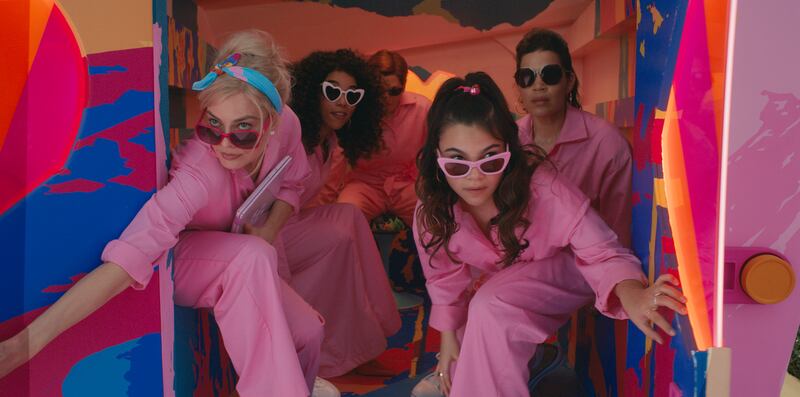
Stacy perfectly encapsulates these thoughts in a monologue near the end of Bat Mitzvah. “When you’re a kid, you think it’s OK to put yourself in front of your friends in pursuit of something better,” she says. “A woman knows there is nothing better than your friends. When you’re a kid, sometimes you think you have to be someone you’re not in order to fit in. But a woman knows it’s not about hiding who you are, it’s about being yourself and speaking the truth.”
These movies, like most coming-of-age tales, may feel like easy viewing. And, well, they are! All three are buoyant, hilarious, touching, and lively—as most adolescent girls ought to be, without the pressures of puberty and growing up to weigh them down. But these aren’t just cutesy chick flicks. They illustrate the difficulties girls go through as they’re becoming women for that exact audience, while keeping that fun, girlish spirit alive. It’s an incredibly important task they all pull off with ease–and that they’re taking up the task at all merits applause.
These movies would’ve emboldened me to love my braces/glasses look, had they been around when I was a kid. OK, that may have been impossible. Instead, they would’ve made me feel like I wasn’t the only one who simultaneously was obsessed and fed up with her self-image. Margaret, Stacy, hell, even bombshell blonde Barbie struggle to become women. It’s not easy. But armed with these movies, at least going through girlhood is a little less lonely. Us girls, we’ve got each other’s backs.

